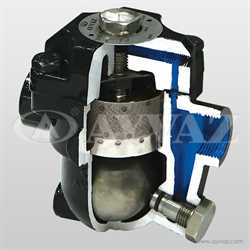
Product Name: Ayvaz SFK-70 Floating Ball Steam Trap
Brand: Ayvaz
Product Code: SFK-70
Tags: Ayvaz
Floating Steam
Ayvaz SFK-70 Steam Trap
SFK-70 Ball
Ayvaz SFK-70 Floating Ball Steam Trap
Ayvaz Floating Ball Steam
Ayvaz SFK-70 Floating Ball
SFK-70 Floating Steam
Ayvaz Floating Ball
Ayvaz Floating Steam Trap
SFK-70 Floating Ball Trap
Ayvaz Floating
Floating Ball
Ayvaz Ball Steam Trap
SFK-70 Ball Steam Trap
SFK-70 Trap
Ayvaz Steam
Floating Ball Steam Trap
Are you interested in the product Ayvaz SFK-70 Floating Ball Steam Trap from manufacturer Ayvaz with code SFK-70? Contact us now and get offer. Imtek Engineering, the fastest and most reliable industrial equipment supplier in the world, will offer you the best offer!
Get Offer With E-Mail: info@im-tek.com
Get a offer for Ayvaz SFK-70 Floating Ball Steam Trap from our live support team now!
This type of steam traps do not contain any lever inside, only moving part is the oat itself. The oat is made of stainless steel with high surface quality. The dimensional tolerance of the float is very low.Body and Cover: Cast SteelFilter and Float: Stainless Steel AISI 304Body Pressure Class: PN32Max. Operating Pressure: 25 barMax. Operating Temp: 220 °C?P: 4.5 / 10 / 14 barConnection: Threaded, Flanged, Weld endOperationWhen trap is cool, the air vent opens wide for continuously discharging initial air. As cold condensate enters the trap, the float rises to allow discharge of condensate from valve port and both air and condensate from orifice.Once all initial air and cold condensate have been discharged, the equipment which is connected to the steam trap reaches the operation temperature.In this case, the condensate amount drops but the temperature rises. Steam enters the trap along with conden-sate, hot condensate heats the air vent and closes before steam can escape.The float can adjust itself according to the condensate flow rate. In order to prevent steam leakage, discharge orifice is always kept under a certain level of water along with metal to metal sealing.For the cases that condensate discharge is operated from the cylinder driers, a by-pass line above the cover is created with the purpose of preventing the steam lock. The aim of this line is to discharge the steam before the correct timing of steam trap entry.Advantages1 - Low cost of installation and equipment2 - Space saver, compact design3 - Built in strainer4 - Homogeneous abrasion on the surfaces5 - Low failure possibility of single moving part6 - Low maintenance cost7 - Well resistance on water hammering